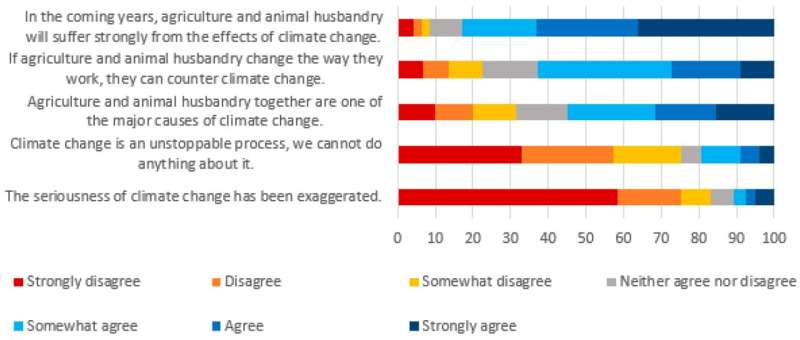This article has been reviewed according to Science X's editorial process and policies. Editors have highlighted the following attributes while ensuring the content's credibility:
fact-checked
trusted source
proofread
No appetite for vegetarian diet to help the planet, finds study

Social media users believe reducing and eliminating meat intake is ineffective in addressing climate change and reported low willingness to engage in either action, according to a new study from La Trobe University.
This is despite recent global reports revealing the strong links between the animal agricultural industry and greenhouse gas emissions, as well as the idea that what people put on their plate is an important piece in confronting the climate crisis.
The study, published in Sustainability, asked more than 700 Facebook account users, between the ages of 18 to 84, about their beliefs on climate change, the impact of meat consumption on the environment and meat intake.
Ashley Rattenbury, co-author and provisional psychologist from La Trobe University, said there is no doubt climate change is a concern for many Australians today.
"Although past research has shown that animal agriculture contributes significantly to greenhouse gas emissions, our participants believed reducing and eliminating meat intake to be some of the least effective actions against climate change," Ashley said.
It's estimated that 80 billion animals a year are raised and killed for food worldwide and, according to the World Economic Forum, Australians are among the highest meat eaters in the world.
This study highlighted an increased awareness that meat-eating has environmental impacts, yet its impact was rated significantly less than other pro-environmental behaviors, such as using public transport, recycling, and renewable energy.
Ashley's co-author Dr. Matthew Ruby, at La Trobe's School of Psychology, compared this study to a similar one conducted in 2003 by Lea and Worsley, which asked hundreds of Australians on their beliefs about barriers and benefits to a vegetarian dish.
"We were surprised that two thirds of participants said that limited options when eating out were a barrier to vegetarian diets," Dr. Ruby said.
"At the time of this present study's data was collected, there was a wider variety of available vegetarian food than at any point in history.
"Compare this to 20 years ago, when only one third of Lea and Worsley's participants agreed that limited options when eating out were a barrier."
The experts say it's critical that future initiatives and campaigns addressing climate change are better informed by people's beliefs and their willingness to engage in pro-environmental dietary behaviors.
"We hope the findings of this study can help shed light on the disconnect between research and public knowledge and subsequently, how to bridge this gap," Ashley said.
More information: Ashley Rattenbury et al, Perceptions of the Benefits and Barriers to Vegetarian Diets and the Environmental Impact of Meat-Eating, Sustainability (2023). DOI: 10.3390/su152115522
Provided by La Trobe University





















